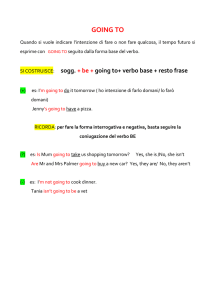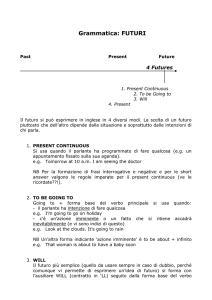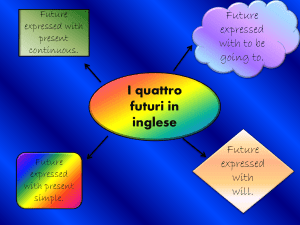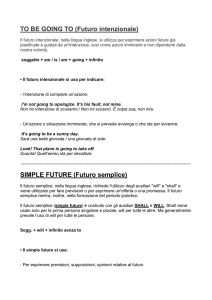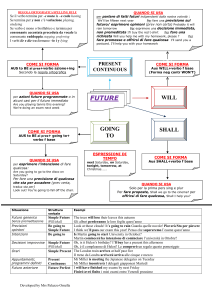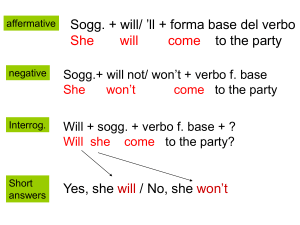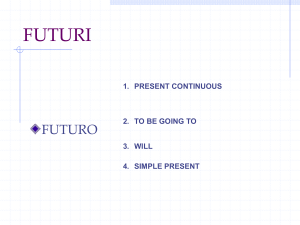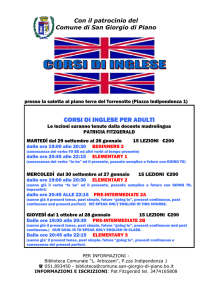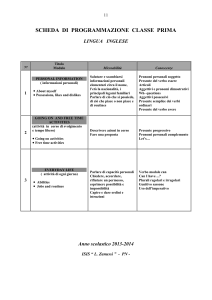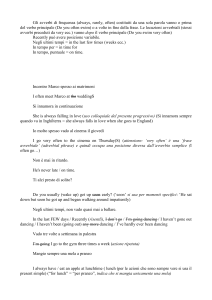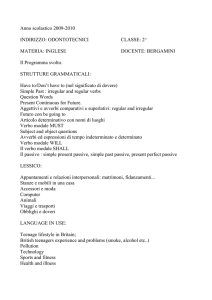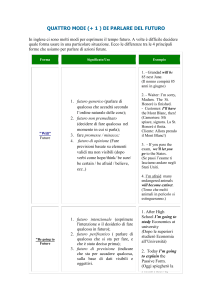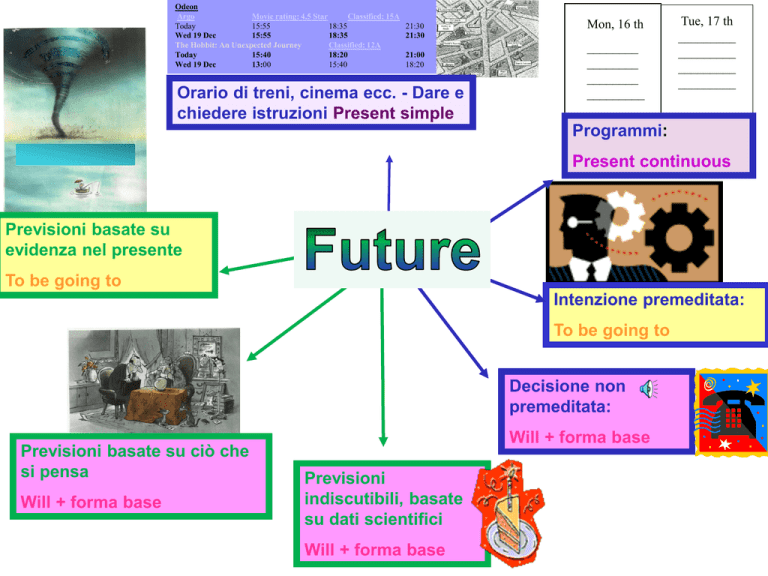
Odeon
Argo
Movie rating: 4.5 Star
Classified: 15A
Today
15:55
18:35
Wed 19 Dec
15:55
18:35
The Hobbit: An Unexpected Journey
Classified: 12A
Today
15:40
18:20
Wed 19 Dec
13:00
15:40
21:30
21:30
21:00
18:20
Orario di treni, cinema ecc. - Dare e
chiedere istruzioni Present simple
Mon, 16 th
________
________
________
_________
Tue, 17 th
_________
_________
_________
_________
Programmi:
Present continuous
Previsioni basate su
evidenza nel presente
To be going to
Intenzione premeditata:
To be going to
Decisione non
premeditata:
Previsioni basate su ciò che
si pensa
Will + forma base
Will + forma base
Previsioni
indiscutibili, basate
su dati scientifici
Will + forma base
Decisioni
Confronto fra
Grammar Files 220
to be going to - present continuous - present simple
Arrangements are in my diary
Mon, 16 th
_________
_________
_________
_________
Tue, 17 th
_________
_________
_________
_________
Plans are in my head
N.B.
I’m going to take the train
She’s going to fly to Rome
I’m taking the 9.05 train
She’s leaving by the 6.25 pm flight
The train leaves at 9.05
The plane takes off at 6.25 pm.
Con go (perché “I’m going to go” suona male)
Ma spesso anche con
-altri verbi di movimento (arrive, come, drive, fly, leave, start, travel),
-verbi che indicano posizione ( stay, remain)
-do e have
Si usa il present continuous invece di to be going to anche se si tratta di
un’intenzione senza un programma preciso
What are
you doing
next
Saturday?
I’m staying at home
I’m not
doing
anything
I’m going to
the seaside
I’m going to
write emails
Grammar Files 222
Will: decisioni non premeditate
- The telephone is ringing
- I’ll answer it
-Your bag is too heavy. I’ll carry it for you
Per ordinare al ristorante
Promesse e minacce
I’ll have a coffe
I’ll give you that book tomorrow
Will è un verbo modale (come can
Can I go to the toilet? )
•
MODALI:
-stessa forma per tutte le persone (no –s alla terza singolare)
-sono seguiti da infinito senza to
- si comportano come ausiliari nelle forme negative, interrogative e risposte breve
•
FORMA AFFERMATIVA:
SOGG. + MODALE + VERBO FORMA BASE (no –s alla terza persona)
Things will change for the better
•
FORMA NEGATIVA:
SOGG. + MODALE FORMA NEGATIVA CONTRATTA + VERBO FORMA BASE
Things won’t change for the better
•
FORMA INTERROGATIVA:
MODALE + SOGG. + VERBO FORMA BASE
Will things change for the better?
•
RISPOSTE BREVI:
SOGG + MODALE (FORMA AFFERM. ESTESA/NEG. CONTRATTA)
Yes, they will / No, they won’t
Eventi decisi da qualcuno
Orario pubblico / azione programmata / intenzione / decisione presa sul momento
-Orari pubblici
(treni, film, corsi ecc)
PRESENT SIMPLE (anche WILL)
My train leaves at six
The film starts at six o’clock
Azione programmata
(è già tutto definito, prenotato ecc.):
Intenzione premeditata
(= decisione presa prima di parlare):
Decisione presa sul momento:
WILL
Your bag is too heavy. I’ll carry it for you
- The telephone is ringing
- I’ll answer it
TO BE GOING TO
Next year I’m going to study hard
PRESENT CONTINUOUS
I’m going to meet Paul at the station
I’m meeting Paul at the station
-> per Paul può essere una sorpresa
-> Paul lo sa, siamo d’accordo
I’m seeing the doctor this afternoon
-> Ho l’appuntamento
A volte
intercambiabili
N.B. Se il verbo principale è go,
generalmente non lo si ripete:
I’m going to go to Scotland next summer
diventa
I’m going to Scotland next summer
Usato anche in
(al bar per ordinare un caffé)
I’ll have a coffe
(promesse o minacce)
I’ll give you that book tomorrow
NB
Per esprimere forte volontà:
ATTENZIONE alle subordinate ipotetiche e temporali:
PRESENT SIMPLE nella subordinata e WILL (di solito) nella principale:
If it snows, I’ll go skiing
I’ll phone John when I am in New York
I will ring him up before he leaves
WILL (Forma non contratta)
I really will stop smoking
Per esprimere rifiuto:
WON’T
The car won’t start = la macchina si rifiuta di partire
Previsioni
Previsioni indiscutibili, basate su dati scientifici
WILL (anche PRESENT SIMPLE)
The sun will rise at 6.30 tomorrow. /The sun rises at 6.30
tomorrow
My son will be 16 next year / It is my birthday tomorrow.
Previsione nell’immediato futuro basata su
evidenza nel presente =“stare per”
TO BE GOING TO
Look at the clouds! It’s going to rain!
A volte
intercambiabili
Previsioni basate su ciò che si pensa:
WILL
I’m sure you’ll enjoy this film.
PRESENT CONTINUOUS
Azione programmata (è già tutto definito, prenotato ecc.):
I’m meeting Paul at the station -> Paul lo sa, siamo d’accordo
I’m seeing the doctor this afternoon -> Ho l’appuntamento
WILL
Previsioni basate su ciò che si
pensa:
I’m sure you’ll enjoy this film.
TO BE GOING TO
Intenzione premeditata (= decisione presa prima di parlare):
Next year I’m going to study hard
I’m going to meet Paul at the station -> per Paul può essere
una sorpresa
Decisione presa sul momento:
Your bag is too heavy. I’ll carry it
for you
- The telephone is ringing
- I’ll answer it
N.B. Se il verbo principale è go, generalmente non lo si ripete:
I’m going to go to Scotland next summer ->
I’m going to Scotland next summer
I’ll have a coffe (al bar per ordinare
un caffé)
Previsione nell’immediato futuro basata su evidenza nel
presente: “stare per”
I’ll give you that book tomorrow
(promesse o minacce)
Look at the clouds! It’s going to rain!
PRESENT SIMPLE
-Orari (treni, film, corsi ecc)
My train leaves at six
The film starts at six o’clock
-Dare o chiedere istruzioni
Well, what do we do now?
Nelle subordinate ipotetiche e temporali:
If it snows, I’ll go skiing
I’ll phone John when I am in New York
I will ring him up before he leaves
Will you help me? Mi aiuti?/Mi vuoi
aiutare? (richiedere che altri facciano
qc.)
Will you have a sandwich? Vuoi un
sandwich? (offrire qualcosa)
Previsioni indiscutibili
Next month I’ll be 20.

